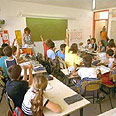
Residents: Arab school will endanger us
Residents at Jerusalem neighborhood say planned Arab school in nearby village will put their lives at risk, note site of planned school has been used as launching pad for previous attacks
Residents of Neve Yaakov neighborhood in northern Jerusalem launched a public campaign Sunday to block plans to build a school in neighboring Arab village Beit Hanina, claiming such school would put the life of Jewish residents at risk.
Community leaders are collecting signatures of local residents for a petition, while residents of the northern Jerusalem community say Molotov cocktail and shooting attacks have been carried out from the site where the school is planned.
The Jerusalem Municipality is considering a construction permit submitted by Beit Hanina in October 1998 to build a school on a former military site abandoned by the IDF 20 years ago.
A visit by municipality officials to the site raised fears among Neve Yaakov residents that a construction permit will be granted.
“The school will undermine the security of residents who live on Moshe Sneh Street and the surrounding area. For the sake of Neve Yaakov residents we demand the cancellation of plans to build an Arab school near the Neve Yaakov,” the petition read.
Gabi Benish, the head of the local council told Ynet: “We have nothing against the Arabs. We are not looking for trouble with them, but in the past stones and Molotov cocktails were hurled and bullets were fired. Locating the school so close to the main road will cause trouble.”
Studying in an apartment building
Mohammad Masri of the Beit Hanina council said the school will serve female elementary pupils and not high school pupils as Neve Yaakov residents argued.
“The current girl school in Beit Hanina is located in an apartment building and has 500 pupils. About 30 to 40 pupils are forced to study in one room meant to serve as a bedroom,” Masri told Ynet.
“In all Arab neighborhoods in north Jerusalem, around 60,000 Arab residents, there isn’t a single high school for example,” Masri added.
“For some, torpedoing projects in the Arab sector is a commandment. It is a school for elementary female pupils who do not engage in protests and other nonsense,” he said.
East Jerusalem suffers from a serious lack of schools. In 2002, the Jerusalem Institute for Israel Studies predicted that by 2005 some 1,155 classrooms will be lacking in schools in the Arab part of the city.










